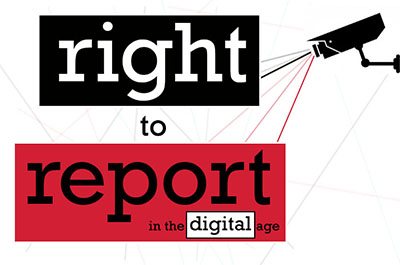Pakistani journalists I have met over the years know that while I might be an American, I have never been an apologist for the U.S. government. The goal of the Committee to Protect Journalists is to assist members of the press no matter where they are, and if we have to criticize their governments, well that’s part of the job. We don’t accept money from any government, and we don’t promote any government’s policies. We stay focused on journalists, their safety, and their rights. My beat is Asia, and the threats and intimidation faced by journalists working in that region is where our Asia team puts its focus.
But CPJ’s Americas program has a battle just as big. American journalists, those working here in the United States of America, are coming under increasing pressure. CPJ has taken on the White House and the Obama administration, and their incessant drive to shrink media space. One year ago, when we published The Obama Administration and the Press, we said:
U.S. President Barack Obama came into office pledging open government, but he has fallen short of his promise. Journalists and transparency advocates say the White House curbs routine disclosure of information and deploys its own media to evade scrutiny by the press. Aggressive prosecution of leakers of classified information and broad electronic surveillance programs deter government sources from speaking to journalists.
One year later the situation hasn’t gotten any better. My colleague across the room in the Americas program, Sara Rafsky, just posted “One year after CPJ’s US report, little has changed between Obama and press,” describing the continuing downward trajectory journalists are facing here.
I’m not saying the U.S. is Pakistan: American journalists, unlike those in Pakistan whose cases CPJ has documented, aren’t facing death threats; militant groups aren’t driving by our TV crews and spraying their broadcast vans with machinegun fire; government agents aren’t the prime suspects in the abduction, torture, and killing of reporters; anchors and editors aren’t being assassinated in their offices or in their cars. But American reporters are coming under increased surveillance and intimidation from their government and its state security apparatus. The threat of jail has increasingly become a concern for reporters who work to reveal government secrets. And when the American government behaves like that, it makes it just that much easier for the Pakistan government, or any government, to do the same thing. Already, Edward Snowden’s revelations about the National Security Agency have been used by Pakistani authorities to strengthen their argument for greater surveillance, CPJ reported earlier this year.
To fight the battle on our home turf, CPJ has launched a petition called Right to Report. You can also join here. Prominent American journalists and news organizations including Christiane Amanpour, Alan Rusbridger, The Associated Press, and Bloomberg News have signed on, and we’re trying to get as many of our colleagues outside the country to do the same thing.
CPJ has always tried to be there for journalists in Pakistan. This time, we’re asking you to stand with your colleagues here in America. Please sign the petition. We need your help.
